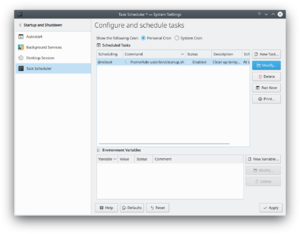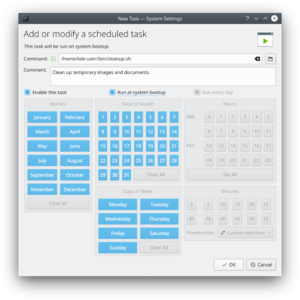System Settings/Task Scheduler/en: Difference between revisions
(Updating to match new version of source page) |
(Importing a new version from external source) |
||
| Line 15: | Line 15: | ||
==== Adding and Modifying tasks ==== | ==== Adding and Modifying tasks ==== | ||
* Click "New Task..." to add a new task, or "Modify" to modify an existing task. The '''Add or modify existing task''' page will be displayed. | * Click "New Task..." to add a new task, or "Modify" to modify an existing task. The '''Add or modify existing task''' page will be displayed. | ||
Revision as of 09:20, 25 December 2018
General Information

Usage
Task Scheduler can be started by starting the System Settings application, and selecting . New tasks can be added and existing tasks edited or removed.
Adding and Modifying tasks
- Click "New Task..." to add a new task, or "Modify" to modify an existing task. The Add or modify existing task page will be displayed.

- Enter the command to be run. Click the folder icon to choose it from a dialog.
- Enter a comment (optional). This should be descriptive, explaining what the task will do as the command may not always be obvious.
- Click Enable this task to enable the task to run.
- Click Run at system bootup to enable the script to run each time the system is booted.
- Click Run every day to enable the script to run every day. This will automatically select the appropriate options.
- Using the buttons, choose when the command should be run. Not all parameters are required, those not needed may be left blank.
- Hours and Minutes are the time of day to run the task, not an interval.
- When done, click . The task will be added and scheduled if enabled.
Hints
- All the files that are modified are located in the /etc/cron directory where there are numerous files to look at.
- The command-line tool that allows you to have a look at the currently installed cron-jobs is
crontab -l
(that's the letter L).
